The recent revelation that the Chinese APT41 group impersonated a US lawmaker to deliver malware raises significant concerns about the integrity of information during sensitive negotiations, particularly those concerning US-China trade discussions. This tactic not only jeopardizes the security of the targeted organizations but also indicates a broader strategy by state-sponsored actors to exploit political figures to further their intelligence-gathering objectives. Immediate scrutiny of cybersecurity measures within organizations that engage in trade negotiations is warranted.
The risks associated with such cyber attacks are substantial, as they could compromise sensitive information that may influence trade policies or negotiations. These incidents emphasize the need for organizations to enhance their email security protocols and employ more rigorous verification processes for communication that appears to come from trusted sources. Organizations should also consider conducting training sessions to educate employees about the risks of phishing attacks and the importance of verifying unusual requests for information.
In light of this breach, it is imperative for governmental bodies and trade organizations to collaborate on developing stronger cybersecurity frameworks and protocols. Implementing advanced threat detection systems and fostering a culture of vigilance can mitigate the risks posed by similar tactics in the future. Regular security assessments and updates to incident response plans should be prioritized to prepare for potential cyber threats more effectively.
👉 Pročitaj original: SecurityWeek






